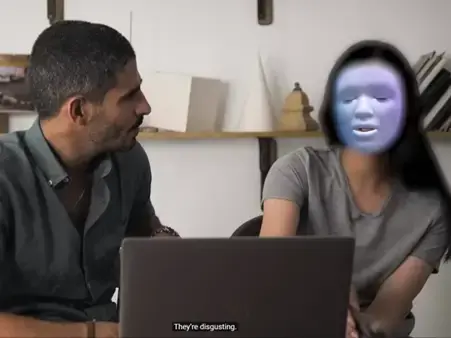
BBC World Service video documentary Queer Egypt Under Attack used AI face-tracking technology to anonymise victims of violence against members of the country’s LGBTQ+ community.
Press Gazette spoke to the documentary’s reporter and director following their win in the Social Affairs, Diversity and Inclusion category at the British Journalism Awards in December.
The judges said: “This was a really important piece of journalism with great bravery required by both reporters and sources.”
While homosexuality is not explicitly illegal in Egypt, it is often criminalised under the “debauchery” law, which was originally intended to outlaw prostitution. Gay people can be arrested even if their sexual relations do not involve payment.
The documentary recorded the stories of survivors of gang attacks and viral “humiliation videos”, in which LGBTQ+ people are often forced to strip and are intimidated on camera.
Director Vanessa Bowles said there were multiple challenges to overcome during the two years it took to produce the film.
She said: “We had to ensure that the footage was encrypted when we took it out of Egypt, we had to ensure that our contributors were safe, we had to build trust.”
Sources were anonymised using AI-generated masks which covered their faces but showed their facial expressions.
Bowles said: “The masks idea was inspired by the Chechnya documentary where they used AI masks of activists over the victims to completely anonymise them.
“The aim was to retain as much emotion as possible because we wanted to keep the expressions alive and identifiable.”
However, producing the masks was not a seamless process, with the project’s visual effects and animation producer, Jasmine Bonshor, having to correct them using frame by frame motion tracking.
How Queer Egypt team built trust with sources
The masked edits were shown to the interviewees during the film’s production to ensure that they were comfortable with the detail shown.
Bowles said: “We established trust by reassuring them that everything would be kept completely anonymous, we provided them with SIMs, with phones to make sure everything was untraceable.
“We visited them a few times without filming at all, explaining the process in detail, it was a very collaborative project.”
The documentary has thus far only been screened in English but there is hope that it will eventually be translated into Arabic.
Bowles explained: “We didn’t want to arouse too much tension in the Arab world because of the complicated reaction it may have received – which is an oxymoron because that’s the intention of the film.”
There is an enforced media blackout in Egypt about LGBTQ+ issues meaning key words in the film would be censored.
Reporter and producer Ahmed Shihab-Eldin agreed, saying: “It was difficult to balance telling this important story but not making the situation worse for the victims and community.”
Due to the nature of the documentary, the team did not travel on journalist visas.
Shihab-Eldin said that when stopped and asked about their project, they had alibis, one of which was to say that they were producing an art project.
He added: “In my career as an on-camera reporter, despite covering a lot of different conflicts, this was by far the hardest to shoot because of the level of secrecy and the need to protect our own safety.”
The team gained access to transcripts documenting conversations between police officers and those they arrested for “debauchery”.
These revealed how police officers had actively targeted those on certain dating apps such as Whoshere and Grindr.
The app Whoshere has made adjustments to improve their security of messages as a result of the documentary and two other LGBTQ apps are understood to be exploring ways to become more secure.
Email pged@pressgazette.co.uk to point out mistakes, provide story tips or send in a letter for publication on our "Letters Page" blog
